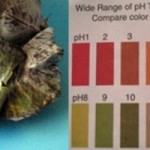
An old book – the smell, the texture of the slowly rotting paper, and the smudges and margin notes accrued over decades – is one of the finer points in life taken for granted much too often. We’re bombarded with high precision vector typefaces all day, but [Dan]’s Avería font is beautiful in its irregularity. [Dan] made a font that is the average of all the fonts installed on his computer, and the result looks surprisingly great.
[Dan] started his journey down the generative font path by making images of every letter of all his fonts and mashing them together with a PHP script. The result was a terribly blurry font, and unfortunately this had been done before. [Dan] wanted a font with clearly defined edges, though, so the obvious solution would be to take the grayscale result of his first experiment, set a threshold, and make a monochromatic image. This plan didn’t pan out, and [Dan] needed a cleverer way to go about things.
The solution to the problem is astonishingly simple; [Dan] took the perimeter of each font glyph and divided it into hundreds of points. These points could then be averaged in 2D space making a real ‘average’ font.
Even though this project isn’t the usual ‘Arduino doing something’ fare, [Dan] came up with a really clever way of doing something that produced something really cool. It’s enough of a hack in our books. Tip ‘o the hat to [Aleks Clark] for sending this one in.





i wonder if you violate all the source font copyrights, or none at all by using a font made this way.
Derivative work? Also output of a computer program. I’d bet a large sum of money that Dan has the copyright on this font.
i dont know if this would be considered a new creation or a derivative work. interesting thought though. depends how much of an ass the legal department feels like being.
It is a new creation… and screw the lawyers! Patents and lawyers are unfortunately killing and hindering creativity these days.
Pretty font and clever idea. I still scratch my head thinking how he did this “easy script” to generate the points. Very nice. Kudos! (BTW: this is how Steve Jobs started and saw beauty in fonts. He took a calligraphy class…)
“Even though this project isn’t the usual ‘Arduino doing something’ fare”
The fact that it’s not makes it more of a hack, not less
That was not meant to imply it was a lesser hack.
Ohh, an eigenfont! Very easy on the eyes and is reminiscent of some of the fonts from the early part of the last century.
Beautiful font. Very easy to read and has an old book feel to it. Need to put it into my ereader.
Interesting idea, personally I’m not sure it is easy on the eyes, but that can be forgiven. Really this is about about the concept, which is fantastic. This does look like a late 19th century advertising font, it might be worth changing the algorithm a bit. Ditch the joke /theme fonts and break up the remainder into serif and non-serif and you’d have a pretty serious output. Many fonts are highly derivative, so depending on the weighting method you would probably end up with the most popular features of the two primary font families.
What a strange font, beautiful, orderly, yet still strange. A great piece of work, no question.
My favorite is Averia Serif GWF, see http://iotic.com/averia/preview.php
This is a lovely looking font. It’s definitely not the easiest on the eyes – f and t especially have this strange blurriness to them. I might be tempted to do a few manual touch-ups to those for improved legibility on small displays.
Awesome project, great hack.
To be honest, it just looks like the results of a printing press with worn stamps or too much ink.
wonder if he kept windingsbat out of the list 😉
hehe thought that too. My windows installation also has some greek fonts and such, would make for a really weird font if one isnt selective enough
Wow, this is really looking pretty. Kudos to the author!